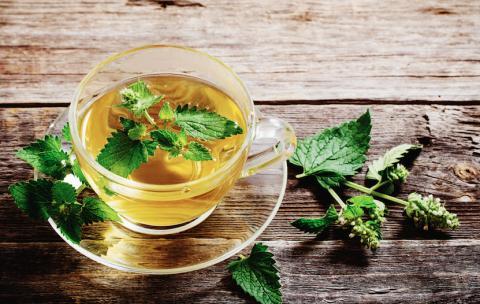
Exploring our ancestors’ use of natural remedies is a fine way to rediscover the forgotten traditional uses for several herbal combinations and tonics. Herbal infused tonics and elixirs reached much farther than a simple tea, as Mother Nature was the sole provider for medicinal tinctures and remedies.
The star of herbal elixirs may have to be awarded to Carmelite water—though it’s not actually water. This distilled beverage was originally infused by Carmelite nuns around the 16th century and recipes were kept secret from abbey to abbey as family traditions. The earliest recipe recorded was in 1379; however, it’s possible there were earlier batches. A couple of herbs remain predominant in all recipes: lemon balm and angelica—both stars known for an astonishing surplus of health benefits for the body (and lemon balm traditionally renders the base for the citrusy flavor).
Lemon balm is a clear choice for such an elixir, as it aids in the support of positive mood for those that suffer from anxiety and depression, improves memory and cognitive function, prevents diabetes, improves sleep quality and so much more. Angelica root has more digestive support qualities than anything else but does yield many other benefits, including aid for those that suffer from loss of appetite, heartburn, insomnia, fever, and even arthritis. It’s no wonder these two herbs are often chosen to set the foundation for a successful batch of Carmelite water.
The development of Carmelite was first introduced when the general population’s wide range of health needs needed to be addressed. As the interactions seemed to work wonders for a broad range of ailments, recipes continued to develop and remain staples for years to come.
Traditionally, the herbs were distilled and made over the course of a few weeks in small batches that granted the infused elixir its potency. The serving size is small, not intended to be consumed like the average boozy drink; a thimble with dinner or just before bed is enough to reap the benefits. Carmelite in its concentrated form can also be used topically or added to bath water for a soak. The scent of the herbs can help calm and revitalize all at once while the herbal properties soak in through the skin. It is said using Carmelite water regularly will encourage positive mood, healthy digestion, and pleasant dreams, and boost the immune system.
You can create your own Carmelite water by simply using the lemon balm and angelica base then adding in the herbs you feel you could benefit most from. You can speak to an herbalist if you are unsure what herbs may be right for you but creating your own tonics gives you the freedom to experiment and decide for yourself.
Recipes for Carmelite water can have as many or as few herbs as a person chooses. Some recipes combine 9-24 different types of herbs and spices to acquire the desired flavor and benefits.
In creating your first recipe for Carmelite water you may want to start with a simple base recipe and add or take away herbs or spices based on your own personal needs and taste preferences. This recipe has been kept fairly simple in order to serve as the best base in your own creations while still yielding traditional benefits and properties of our ancestors’ potions.
Carmelite Water Base
Ingredients
- 1/4 cup dried lemon balm
- 1/4 cup angelica root
- 1/4 cup Melissa
- zest from one small lemon
- one cinnamon stick
- 1/8 teaspoon grated nutmeg
Directions
- Combine all herbs and spices into a large glass mason jar.
- Pour liquid of choice in the jar to saturate the herbs.
- Stir and cover with a lid.
- Steep depending on your choice of extraction: 5 minutes for hot water; 5-6 hours for white wine; and 7 days for vodka.
- Use cheesecloth to strain the herbs
This is a great place to start if you’re new to Carmelite water, or herbal tonics in general for that matter. By starting with a simple recipe, you can add or take away herbs according to your liking, whether it be influenced by taste or health needs.
Herbs To Add To Carmelite Water
Here are some other herbs you may consider adding:
- Chamomile is good for digestive support as well as calming; chamomile can aid in relaxing the body and mind.
- Raspberry leaf is great for women who suffer from premenstrual symptoms, including cramping.
- Holy basil (tulsi) is another multiuse herb that helps the body adapt to stress levels while providing antioxidant nourishment.
- Peppermint calms nausea and provides a fresh flavor.
The benefits of herbs are extremely underutilized in our modern-day society. However, the rebirth of such a long-lost tradition could reawaken the use of these delightfully beneficial potions for years to come, aiding in longevity and preventing unwanted side effects from the overuse of over-the-counter options.








